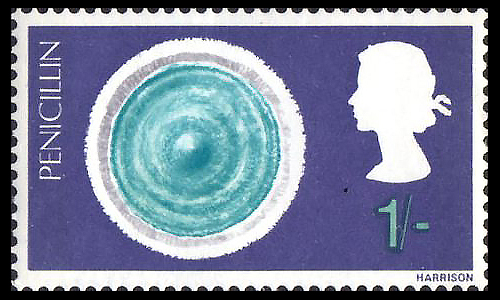The Stamp
This stamp was issued in Great Britain in 1967. It was part of a set depicting great British discoveries. The other stamps showed radar, television and the jet engine.

The Subject
Penicillin was discovered "accidentally" in 1928 by Alexander Fleming who was experimenting with the influenza virus in the Laboratory of the Inoculation Department at St Mary’s Hospital in London.
Fleming returned from a two-week holiday to find that a mould had developed on an accidentally contaminated staphylococcus culture plate. He noticed that the culture prevented the growth of staphylococci:
The staphylococcus colonies became transparent and were obviously undergoing lysis … the broth in which the mold had been grown at room temperature for one to two weeks had acquired marked inhibitory, bactericidal and bacteriolytic properties to many of the more common pathogenic bacteria.
Although Fleming stopped studying penicillin in 1931, his research was continued and finished by Howard Florey and Ernst Chain, at Oxford University, and they are usually credited with the development of penicillin for use as a medicine.
Urology Connections
Probably the greatest change for urologists, as a result of the introduction of penicillin, was in the effective treatment of gonorrhoea; this resulted in a dramatic decline in the number of gonococcal urethral strictures. Urethral stricture was the urological problem most frequently seen by urologists in the late 19th and early 20th centuries.
← Back to Stamp Collection